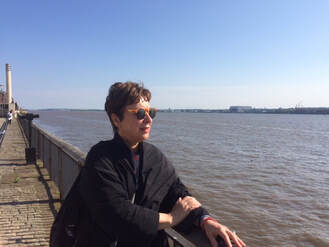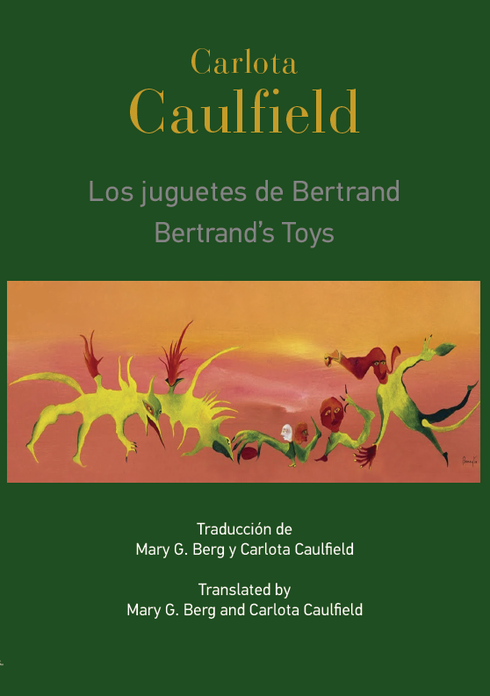Poems by Carlota Caulfield from her book Los juguetes de Bertrand / Bertrand’s ToysReconocimiento Hacía bocetos. Aquí y allá una palabra. Después todo fue simple, un fuego interior que lo consumió de golpe. Al poco tiempo, un exilio impuesto. Después un cambio de fotografías y un borrón en la fecha de nacimiento. Bordes geográficos desvaneciéndose y confundidos en garabatos infantiles, y voces, voces infinitas en asedio. Esperas. Reconstruyes tu perfil y tu acento, vuelves a entrar en tu pasado, permaneces en uno de sus rincones, recorres los barrios de sus excesos, y nunca eres un huésped inoportuno, eso nunca te lo perdonarías. Recognition He made sketches. Here and there a word. Later on it was all-simple: an inner fire gobbled him up. A little later, an imposed exile, Later on, different photographs and a blotch over his birthdate. Geographic lines faded and interchanged over infantile scribbles, and voices, infinite voices laying siege. You wait. You redesign your profile and your accent, you reach the past, you settle into one of its corners, you stroll the neighborhood of your excesses, and you're not an inopportune guest, you'd never forgive yourself that. El oratorio de Aurelia La primera mirada es una mano en movimiento. Una gaveta se abre, otra se cierra, y así combinaciones imposibles del cuerpo. Un trapecio de lo familiar, del perchero y la colcha de la abuela. Cortinas donde se esconde la niñez, esas cortinas rojas del teatro, y el show del circo imaginario para mayores de ocho años. Sabiduría del acróbata y del pintor en su gotear de rojos y esos verdes y esos amarillos. Casi se pueden tocar. Entonces, los waltzes pirotécnicos, los abrigos y vestidos con vida propia, la música de acordeón, tangojazz, y trombón, eso parece. Y cuando todo se ha vuelto un Magritte, el timbre de un móvil desata una pelea violenta entre los otros, audiencia de marionetas crueles. Fin de la primera parte. Aurelia's Oratorio At first glance, it's a hand in motion. A drawer opens, another closes, and thereby impossible body combinations. A trapeze of the familiar, of the hanger and Grandma's bedspread. Curtains where childhood hides, those red curtains of the theater, and the show of the imaginary circus for those over eight. Wisdom of the acrobat and the painter in his splashing of reds and those greens and those yellows. You can almost touch them. Then the pyrotechnic waltzes, the coats and dresses coming to life, accordion music, tangojazz and trombone, that's what it's like. And when everything has turned into a Magritte, the ring of a cellphone unleashes a violent fight among the others, audience of cruel marionettes. End of part one. The poem “Aurélia’s Oratorio” alludes to the theater piece of the same name, a combination of a magic surreal show and acrobatics created and directed by Victoria Thierrée Chaplin that her daughter Aurélia Thierrée performs with extraordinary mastery and grace in theaters around the world. Nueve poemas para Charlotte 1. Agrietadas de pasión, las manos del titiritero descansan. Sólo en un pestañear, las marionetas se mueven y se confunden, y se enredan en sus cuerdas. Conmoción de un instante. 2. Dentro del armario, la sombra de un antiguo Pinocchio es una marca perenne. Así se hace la memoria y eso es lo mejor de todo, dejar que el corazón se fragmente con el tacto. Lo inexistente ha dejado un recuento. 3. Sus labios en una taza de té. Un sabor verde de Himalayas se confunde con la vasija terracota curtida por el uso. Capas y capas de residuos, testigos impregnados en el barro. Pone a un lado su diario. Mapa Mundi. 4. Su nombre reaparece en diferentes formas. En caligrafía es trazo llamado Tao. Su efímera inscripción lleva la espiritualidad de los sentidos. Digo y cuento, aunque raras veces es también toque de inscripción propia. 5. Puertas hinchadas de aguas a destiempo, como si la torrencial lluvia se hubiese vuelto un dulce y pegajozo delirio mientras observas las vestiduras extraviadas de la madera. En la ventana, una silente figura vacila. Y de pronto, el espacio de sonidos se confunde con grises, blancos y verdes. Lo de afuera entra y roza tus manos. 6. Ella, la que eres tú en ciertos días, deja un rastro de bruma y se reclina sobre varios senderos. Atrapar lo inasible se vuelve aquí furor y apatía. 7. Pasas bordeando voces. No quieres quedarte en la orilla de la muerte. Como un animal ebrio de miedo te enroscas hasta que la lluvia cese. Palabras en desorden. Trabalenguas. 8. Tú misma eres una abstracción. Todos los remedios disolviéndose. Noches de insomnio cercanas a la locura. Así tu cuerpo. Las treguas conjuradas. La parálisis un abismo de telas. La corrugada pesantez de tu espalda mancillada por bloques terapeúticos. 9. Mientras intocable hasta en la palabra, la presión de dedos y el aire denso de lugar a lugar, a tus labios coarteados les frotas unas gotas de miel y los pules como si fueran un desgarrón purpúreo. Así tus huesos, nervaduras de sombras chinescas lanzadas al piso. Tú. Nine Poems for Charlotte 1. Cracked by passion, the puppeteer’s hands rest. With only a blink, the marionettes move and are baffled, and get tangled in their cords. The commotion of an instant. 2. Inside the wardrobe, the shadow of an ancient Pinocchio is a perennial imprint. This is how memory is made and that’s the best of it all, to allow the heart into pieces if touched. The non-existent has left a trace. 3. Her lips sipping a cup of tea. A Himalayas’ green flavor is fused with the terracotta cup stained by use. Residual layers and layers, witnesses impregnated in the clay. She puts aside her diary. Mapa Mundi. 4. Her name reappears in different ways. In calligraphy it’s a pen stroke called Tao. Its ephemeral inscription carries the spirituality of the senses. I say and tell, although rarely it’s also a touch of self-inscription. 5. Doors swollen by untimely waters, as if the torrential rain had become a sweet and clinging frenzy while you observes the lost garments of the wood. In the window, a silent figure hesitates. And suddenly, the space of sounds blends with grays, whites and greens. The outside comes in and grazes your hands. 6. She, the one you are on certain days, leaves a trace of mist and bends, over several paths. Here to grasp the unreachable is fury and apathy. 7. You stroll around voices. Not wanting to remain on the verge of death. Like an animal drunk with fear you huddle until the rain stops. Words in disorder. Tongue Twisters. 8. You are yourself an abstraction. All solutions are dissolving. Nights of insomnia close to madness. So is your body. Conjured ceasefires. Paralysis, an abyss of cloths. The corrugated and heaviness of your back sullied by therapeutic blocks. 9. While untouchable even by words, the pressure of fingers and the misty air from place to place, onto your cracked lips you rub some drops of honey and you polish them like a purplish tear. And your bones, too, Chinese shadows nervures tossed on the floor. You. Bosques de Bélgica Voz suelta. Pura respiración. Labios de breves heridas. Después, un tañido. Boca sobre el metal. Voz hueca y los labios un pico abierto de pájaro. El aire es murmullos, rumores, silbidos, y marca permanente en la cámara interio. Rapidez del movimiento de la vara, privilegio de una mano. La mano tiene forma de U. Es una U. En el cielo de Berkeley hay pocas nubes, decías lentamente. Cierto, el aerófono es latón ligero, tríptico en un cuadro donde un trombón de vara parece pájaro en vuelo y alas de ángel. ¿Quién recuerda el nombre del cuadro? ¿Cómo se llamaba el pintor? Belgian Forests Voice unleashed. Pure breathing. Lips of brief wounds. Then, a note. Mouth to metal. Hollow voice and lips a bird's open beak. The air murmurs, whispers, whistles, and permanently marks the inner chamber. Rapidity of the valve's movement privilege of a hand. The hand is U shaped. It’s a U. In the Berkeley sky, here are few clouds, you were saying slowly. True, the aerophone is a light brass triptych in a painting where a valved trombone looks like a bird in flight, and angel wings. Who remembers what the painting is called? What was the painter's name?  Photo by David Summer at the Mersey in Liverpool, UK Photo by David Summer at the Mersey in Liverpool, UK Carlota Caulfield is a Cuban-born American poet, writer, translator and literary critic. She has published extensively in English and Spanish in the United States, Latin America and Europe. Her most recent poetry books are Cuaderno Neumeister / The Neumeister Notebook (2016) and Los juguetes de Bertrand / Bertrand’s Toys (2019). She is the recipient of several awards, among them The International Poetry Prize Dulce María Loynaz and The Ultimo Novecento, Poets of the World. Caulfield has also published widely on Argentine poet Alejandra Pizarnik, as well as on other Latin American and Latinx poets, including Magali Alabau and Juana Rosa Pita. She is the co-editor of A Companion to US Latino Literatures (2012 &2014) and Barcelona, Visual Culture, Space & Power (2012 & 2014). She is Professor of Spanish and Spanish American Studies at Mills College, Oakland, California. Mary G. Berg, a Resident Scholar at the Women’s Studies Research Center at Brandeis University, Boston, Massachusetts, has translated poetry by Juan Ramón Jiménez, Clara Roderos, Marjorie Agosín and Carlota Caulfield and novels by Martha Rivera (I’ve Forgotten Your Name), Laura Riesco (Ximena at the Crossroads), Libertad Demitropulos (River of Sorrows). Her most recent translations are of collections of stories by Olga Orozco and Laidi Fernández de Juan.
0 Comments
Your comment will be posted after it is approved.
Leave a Reply. |
Archives
July 2024
Categories
All
|
Donate and Make Literature Happen
is published by the Somos En Escrito Literary Foundation,
a 501 (c) (3) non-profit, tax-exempt corporation. EIN 81-3162209



 RSS Feed
RSS Feed